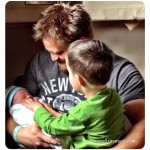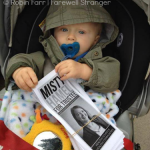Tomorrow I will be exactly 38 weeks pregnant.
Connor was born at 38 weeks to the day, but he was breech – so stubbornly breech that we never really got into many discussions about labour and birth. Though looking back, I’m not sure it would have occurred to me that birthing a baby was anything other than contractions > hospital > decision about pain management > pushing > voila, a baby.
I had read some books and we had done prenatal courses but most of what is presented as the de facto way of birthing babies in our society is so clinical, isn’t it? So factual. You either refuse an epidural (in which case you’re a goddess) or you get one (in which case you’re being smart, because why suffer needlessly?).
Or you get a C-section.
And that’s where most of our dialogue about birth comes in, at least in my experience. And most of it is after the fact.
A C-section for many, myself included, is not the desired birth experience. It doesn’t meet our expectations for how we will bring our children into the world, as though the experience of giving birth is somehow a profound rite of passage into motherhood. The baby gets here either way, to be sure, and giving birth – in whatever fashion – doesn’t actually make a woman a mother.
But the experience is profound and the method does matter, and anyone who dismisses a woman’s grief over a C-section simply doesn’t get it.
So why don’t we talk about this more in the weeks and months ahead of our babies’ births?
I, like many other women, skipped the C-section parts of my labour and delivery books. I thought I was going to have a choice. (I didn’t, really, though four years later I still question whether there’s anything I could have done.)
In many cases, women do have a choice – they just don’t know it. How many of you became educated about labour and delivery after the birth of your first child? That’s the case for many women I know. (For me I think it really started when I saw The Business of Being Born shortly after Connor was born.) I’m not saying birth needs to be complicated — I’m really not in a position to make that sort of assertion — but I do think we need to have more conversations about what we hope to get out of the experience.
Other than a healthy baby, of course. Let’s just put that out there. We all want a healthy baby (and a healthy mother) and we will do whatever is necessary in the moment to protect our baby’s health. But birth is more than that, and it’s okay that it’s more than that.
I have had midwives for both pregnancies, and while both experiences have been positive and definitely in line with what we were looking for with prenatal care I’m surprised at the lack of discussion about the birthing process. At my 36-week appointment a couple of weeks ago I asked my midwife about this, and we had an interesting discussion about how things might go. The assumption in her response was that I would avoid an epidural, or any pain relief for that matter, and simply work with my body. Which I think is fantastic and definitely what I’m hoping to do, but I’m not sure it’s safe to assume a woman will be planning that approach or, more importantly, know how to achieve it.
A couple of months ago we were at the library and while Connor browsed through his book selections I poked around in the pregnancy and birth section. I picked up a couple of things, put them back, and then came across HypnoBirthing: The Mongan Method: A natural approach to a safe, easier, more comfortable birthing. I almost skipped right over it on the shelf for fear it was too hippie for me, but something compelled me to grab it and check it out.
Later that night I asked on Twitter if anyone had used hypnobirthing. Expecting crickets, I was surprised at the onslaught of responses I got from women who not only used it but credited it with giving them the birth experience they had hoped for. So I cracked open the book and contained therein was not only a method of birthing but a philosophy.
For me, it wasn’t the philosophy itself that was interesting. It was the notion that a particular kind of birth experience is something we can discuss and aim for and hopefully achieve with a bit of insight and some tools to help us get there.
I don’t know what my birth experience will be this time around. I’m trying to have an open mind and accept whatever happens (though I’m already enjoying the novelty of the early signs of labour I’m experiencing). But regardless of how this next, and presumably last, birth experience turns out, at least this time around I feel better informed.
I’m interested in hearing about your experiences with birth conversations – let me know in the comments.
Just so you know: The link to the hypnobirthing book above is an affiliate link. I really like this book and am grateful to have found it, and if you choose to buy it also I’ll get a penny or two when I accumulate enough for Amazon to actually pay me.

















